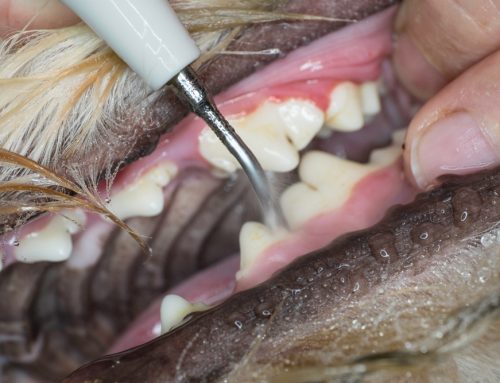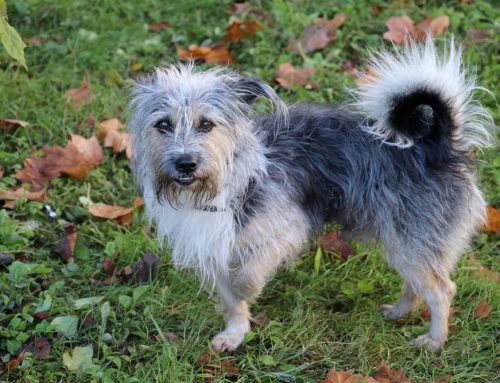Let’s go on a summer adventure together, and our Southern Crossing Animal Hospital team will point out safety tips along the way. How about a hike?
Never leave your dog in the car
You wake up on a beautiful, warm June morning, and decide to go hiking with your dog. What fun! First, what should you bring? Water, some snacks, a few other essentials. You realize you will have to stop at the store to get some snacks. You know the worst thing you can do in summer is to leave your dog in your car while you go into a store, because cars heat up quickly in hot parking lots, and dogs left inside for only a few minutes can quickly become sick with heatstroke, and some may die. Although stopping at the grocery store on the way to your hike would be more efficient, you pet your dog on the head, and tell them you will be right back, and to be ready for the hike. Your dog wags their tail, excited with anticipation.
Buckle up
You return with your hiking snacks, as well as dog treats. Now you are ready to go. You open the door, let your dog in the car, and buckle up their seat belt—not any seat belt, but a dog-specific seat belt and harness system, because regular car seat belts are made for humans, not pets. Your dog is generally a good passenger, but you know they could get injured if you had to suddenly stop, and they were not strapped in.
Protect your pooch’s paws
You arrive at the trailhead, and park in the paved parking lot. Before letting your dog out of the car, you place your full hand, palm down, onto the pavement to ensure it’s not too hot—if the pavement is too hot for your hand, it is too hot for your dog’s paws. Too many pet parents do not realize that their dogs are basically barefoot, and their paw pads can be severely burned without proper precautions. You feel that the pavement is a little too hot for your dog’s feet, so you carry them from the car to the dirt trail, so their paws don’t touch the hot pavement.
Stop the sun from burning your pet
As you start to hike, the sun is shining through the tree leaves. You start to feel the warmth tingling on your skin, and realize that you forgot to put on sunscreen—how silly. So, you apply sunscreen to your skin, and then notice that your dog, who is waiting patiently to get going, has some redness around their nose. They are getting sunburned as well. Although fur covers most of a dog’s body, some areas, such as the nose and muzzle, around the ears, the armpits, belly, and the groin area, are less furred, and susceptible to sunburn. If your dog will be spending time outside in the sun, ensure you protect them with pet-safe sunscreen.
Don’t forget water and shade
As the day goes on, the temperature soars. You are feeling the heat. You look over at your dog, and see they are panting, with their tongue hanging out of their mouth. Panting is a dog’s way to release extra heat from the body, because they can’t sweat like humans. Imagine hiking in the heat wearing a permanent fur coat, like your dog. “We should stop more frequently in the shade, and give you water and rest,” you tell your dog, who looks up at you with a happy dog smile. “Also, before the next hike, I’ll get you to the groomer, to help keep your body cooler in the heat,” you promise.
Protect against parasites …
You continue down the trail, and come to a swampy area. Don’t get us wrong—swamps are incredibly important ecosystems, but they tend to breed mosquitoes, which may be only a nuisance to humans, but they can carry a parasite called heartworm that can be dangerous for dogs. An infected mosquito that feeds on your dog can pass on heartworm larvae if your dog isn’t properly protected with some form of heartworm prevention. The larvae can mature into adult heartworms inside your dog’s lungs and heart and cause serious problems, and sometimes death. Since you give your dog their heartworm preventive regularly, you breathe a sigh of relief.
… and ticks

At the end of the day, you head home together, tired, but content, because you shared a wonderful hike. When you arrive home, you tick-check yourself and your dog. “That flea and tick preventive sure does help,” you say, because you used to find all kinds of ticks on your dog after being outdoors. “Did you enjoy our adventure today, bud?” Your dog looks up, and licks your face, to say, “I love you, too.”
At Southern Crossing Animal Hospital, we want your summer adventures with your furry friends to be as safe as possible. If you have any questions about summer safety, do not hesitate to contact us. And, if you run into any concerns while out adventuring, make an appointment with one of our wonderful veterinarians.







Leave A Comment